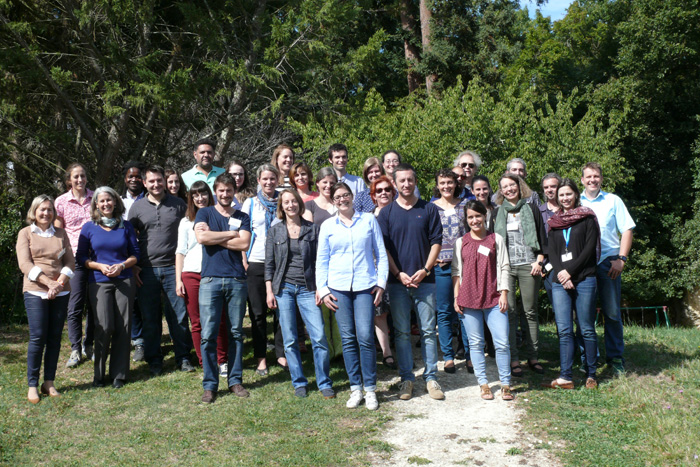
 epoc.u-bordeaux1.fr
epoc.u-bordeaux1.fr
There is an open call for letters of interest to participate in the Global Paleofire Working Group workshop titled "Fire history baselines by biome", for which a limited number of places are available. Early-career scientists and researchers from developing countries who work on the topic of paleofire are especially encouraged to apply.
Workshop details
The workshop will be held 25-29 September 2016 near Bordeaux, France, at Château de la Tour, Beguey, 33410. Address: 2 avenue de la Libération, 33410 Beguey, France.
http://www.hotel-restaurant-chateaudelatour.com/fr/index.php
It is organized as part of a CNRS-PICS-funded project called "Investigating controls of orbital changes in biomass burning at the biome-level", and is the first workshop of the PAGES' Global Paleofire Working Group phase 2 (GPWG2) http://www.gpwg.paleofire.org/ which aims to merge global paleofire records with global Earth system models to understand how vegetation and climate controls fire during abrupt and transient climate changes.
Overview
Fire is projected to increase in some regions of the globe in response to global warming and regional moisture anomalies from rising atmospheric greenhouse gases. Large uncertainties and biases remain, however, in integrating fire into global models of the Earth system.
For some projections, only climate is considered for estimating fire risk, even though vegetation is an important determinant of fire dynamics and responds itself to climate. Drying can influence fire activity in opposing directions: a fire increase in fueled ecosystems, or a fire reduction in fuel-limited ecosystems. A solid understanding of the baseline variability of fire regimes that integrates both fire and vegetation feedbacks is therefore necessary to make accurate projections about regional fire regimes.
Workshop objectives
The aim of the workshop is to foster interdisciplinary collaborations between data experts and fire modelers to explore fire-vegetation-climate linkages under different climate boundary conditions, in order to establish common rules of fire activity for the past, present, and future.
The workshop will focus specifically on analyzing transient and abrupt climate shifts of the late Quaternary documented in reconstructions and in models, which together can reveal the response of fire to various climate drivers.
1. Identify where and/or when climate change implies systematic shifts of fire regimes across different biomes
2. Identify processes causing fire regimes to change by comparing associated changes in vegetation
3. Determine whether a change in a fire regime leads or lags vegetation changes
4. Identify thresholds and reversibility of changes in fire regimes
5. Identify the resilience of vegetation in response to a change in fire regime.
Applications
All research scientists with an interest in paleofire and/or vegetation relationships for the last climatic cycle are invited to apply to attend.
To apply, email al.daniau@epoc.u-bordeaux1.fr with your name, position, affiliation and a short paragraph (15 lines) explaining why you would like to attend the workshop, what you hope to contribute to the efforts, and what you are most interested in studying.
Please note whether you will need funding support to attend the workshop.
Deadlines
Deadline for applications is 15 February 2016.
Workshop schedule
Sunday 25 September/day 1: Arrivals & dinner
Monday 26 September/day 2: Overview & introductions, sub-groups formed
Tuesday 27 September/day 3: Working group sessions, report-outs
Wednesday 28 September/day 4: Working group sessions, plenary discussion, future plans
Thursday 29 September/day 5: Departure
Confirmed speakers
A-L. Daniau, CNRS Université de Bordeaux (France) - ACER charcoal database
T Brücher, GEOMAR (Germany) - Simulation of climate and fire for a full climatic cycle
B Vannière, CNRS Université de Franche Comté (France) - Global Charcoal Database
JR Marlon, Yale University (USA) - Paleofire data-model integration and links with other databases for multidisciplinary approaches
S Brewer, University of Utah (USA) - Vegetation during the last deglaciation
SP Harrison, University of Reading (UK) Biome – ACER pollen database
M Kageyama, CNRS LSCE (Paris) - Climate simulation for abrupt event
G Lasslop, MPI f. Meteorology (Germany) - Tree cover bistability in the MPI Earth system model due to fire-vegetation feedback.
Two invited early-career speakers are still to be selected.
Financial support
Limited financial support from PAGES is available to supplement participant travel – particularly for early-career scientists and researchers from less developed countries.
Further information
For questions please contact Anne-Laure Daniau at al.daniau@epoc.u-bordeaux1.fr
Post-meeting material

Participants:
Ben Abbott, Michigan State University/Université de Rennes 1, USA/France, benabbo@gmail.comJulie Aleman, University of Yale, USA, julie.aleman@yale.eduPatrick Bartlein, University of Oregon, USA, bartlein@uoregon.eduSiria Biagioni, University of Göttingen, Germany, siria.biagioni@biologie.uni-goettingen.deOlivier Blarquez, Université de Montréal, Canada, blarquez@gmail.comTim Brücher, GEOMAR, Germany, tbruecher@geomar.deDaniele Colombaroli, University of Bern, Switzerland, daniele.colombaroli@ips.unibe.chAbraham Dabengwa, University of Cape Town, South Africa, abrahamdabengwa@gmail.comAnne-Laure Daniau, UMR EPOC, France, anne-laure.daniau@u-bordeaux.frStéphanie Desprat, UMR EPOC, France, stephanie.desprat@u-bordeaux.frElisabeth Dietze, GFZ Potsdam, Germany, edietze@gfz-potsdam.deAngelica Feurdean, Senckenberg Biodiversity and Climate Research Centre AND Babes Bolyai, Germany, angelica.feurdean@gmail.com; angelica.feurdean@senckenberg.deGraciela Gil-Romera, Pyrenean Institute of Ecology, Spain, graciela.gil@ipe.csic.esSandy Harrison, University of Reading, UK, s.p.harrison@reading.ac.ukFlavio Justino, Universidade Federal de Vicosa, Brazil, fjustino@ufv.brMasa Kageyama, LSCE, France, Masa.Kageyama@lsce.ipsl.frSilvia Kloster, MPI f. Meteorology, Germany, silvia.kloster@mpimet.mpg.deGitta Lasslop, MPI f. Meteorology, Germany, gitta.lasslop@mpimet.mpg.deMaria Leunda, Pyrenean Institute of Ecology, Spain, mleunda@ipe.csic.esBérangère Leys, Kansas State University, USA, berangereleys@gmail.comJenn Marlon, University of Yale, USA, jennifer.marlon@yale.eduAndrea Meyn, Karlsruhe Institute of Technology (KIT), Germany, andrea.meyn@kit.eduChiara Molinari, Lund University, Sweden, chiara.molinari@nateko.lu.seAnna Phillips, University of Toronto, Canada, anna.phillips@mail.utoronto.caJosue Polanco, UMR EPOC, France, josue.m.polanco@gmail.comDamien Rius, UMR Chrono-environnement, France, Damien.Rius@univ-fcomte.frMaria Fernanda Sanchez Goñi, UMR EPOC, France, maria.sanchez-goni@u-bordeaux.frMichal Slowinski, Institute of Geography and Spatial Organization Polish Academy of Sciences, Poland, michal@geopan.torun.plMagdalena Sobol, University of Toronto, Canada, magdalena.k.sobol@gmail.comCarla Staver, Yale University, USA, carla.staver@yale.eduBoris Vannière, UMR Chrono-environnement, France, Boris.vanniere@univ-fcomte.frLucien Von Gunten, PAGES, Switzerland, lucien.vongunten@pages.unibe.ch